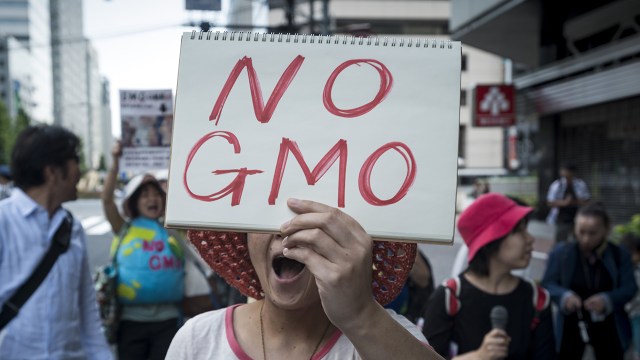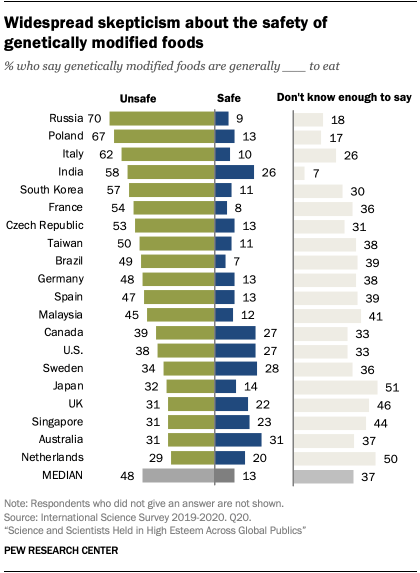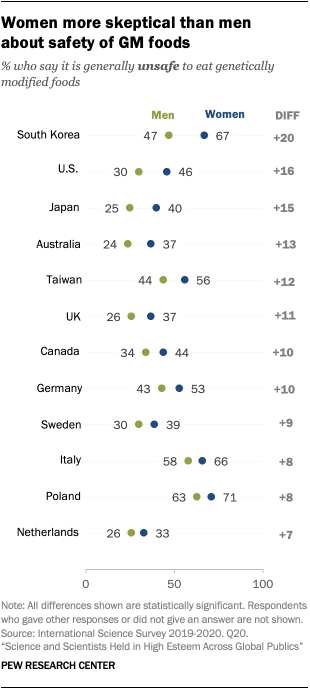
Concern about genetically modified foods is widespread globally, with about half of people in 20 publics around the world saying these foods are unsafe to eat, according to a Pew Research Center survey conducted between October 2019 and March 2020.
As growth in the world’s population increases demand on the global food supply, nations have debated the role of genetically engineered or genetically modified foods. Advocates see such foods as one route to meeting food production demands.
This analysis is part of a study focused on understanding public opinion across a range of science-related issues. The data reported here comes from a survey conducted in 20 publics across Europe, Russia, the Americas and the Asia-Pacific region from October 2019 to March 2020. The surveys were conducted by face-to-face interviews in Russia, Poland, the Czech Republic, India and Brazil. In all other places, the surveys were conducted by telephone. All surveys were conducted with representative samples of adults ages 18 and older in each survey public.
Here are the questions used for this report, along with responses, and the survey methodology.
A 20-public median of 48% say genetically modified, or GM, foods are unsafe to eat, while a much smaller median of 13% say GM foods are safe. The survey included an option for people with limited familiarity about GM foods to indicate this; a median of 37% say they don’t know enough to offer a view about the safety of GM foods.
Majorities in places such as Russia (70%), Italy (62%), India (58%) and South Korea (57%) view GM foods as generally unsafe to eat. The balance of opinion tilts negative even in places where sizable shares say they don’t know enough about GM foods to offer a view. For example, 47% of Spaniards say GM foods are unsafe, while just 13% say they are safe to eat. Australia is the only place surveyed where at least as many view GM foods as safe as view them to be unsafe (31% to 31%).
The introduction of genetically modified crops and other developments in biotechnology have dramatically changed agriculture and food production in many parts of the world in recent decades. Some worry about possible health implications from these new practices, though that view is at odds with scientific consensus. A 2016 report from the National Academies of Science, Engineering and Medicine highlighted a consensus among scientific experts in the United States that GM foods are safe. In 2019, an expert panel in Japan came to the same conclusion.
Still, regulations of GM foods are dramatically different around the world. Many European countries, such as France and Germany, have banned growing GM crops. The U.S. and Brazil generally have more favorable regulations for GM crops and are among the world’s largest producers of such crops.
On balance, men and women generally view GM foods as being unsafe rather than safe. Women are especially likely to express concern about the safety of GM foods, however.
In 12 of the 20 publics surveyed, larger shares of women than men describe GM foods as unsafe to eat. For instance, women are at least 10 points more likely than men to see GM foods as unsafe in South Korea (20 points), the U.S. (16 points) and UK (11 points).
The gender gap in the U.S. is in line with previous Center research that found American women are more likely than men to say GM foods are worse for one’s health than non-GM foods (58% to 42% in 2019).
In most places, both those with higher and lower levels of education tend to see genetically modified foods as unsafe to eat. However, people with more education, and specifically those who have completed at least three science courses during their secondary or tertiary schooling, are more inclined to see GM foods as safe. For example, in the Netherlands, 27% of those with at least some postsecondary education who completed two or fewer science courses consider GM foods to be safe, while half of those who completed at least three science courses say the same.
Note: Here are the questions used for this report, along with responses, and the survey methodology.

"world" - Google News
November 11, 2020 at 11:02PM
https://ift.tt/3eQ5Dgd
On genetically modified foods, widespread skepticism in 20 publics - Pew Research Center
"world" - Google News
https://ift.tt/3d80zBJ
https://ift.tt/2WkdbyX
Bagikan Berita Ini
















0 Response to "On genetically modified foods, widespread skepticism in 20 publics - Pew Research Center"
Post a Comment